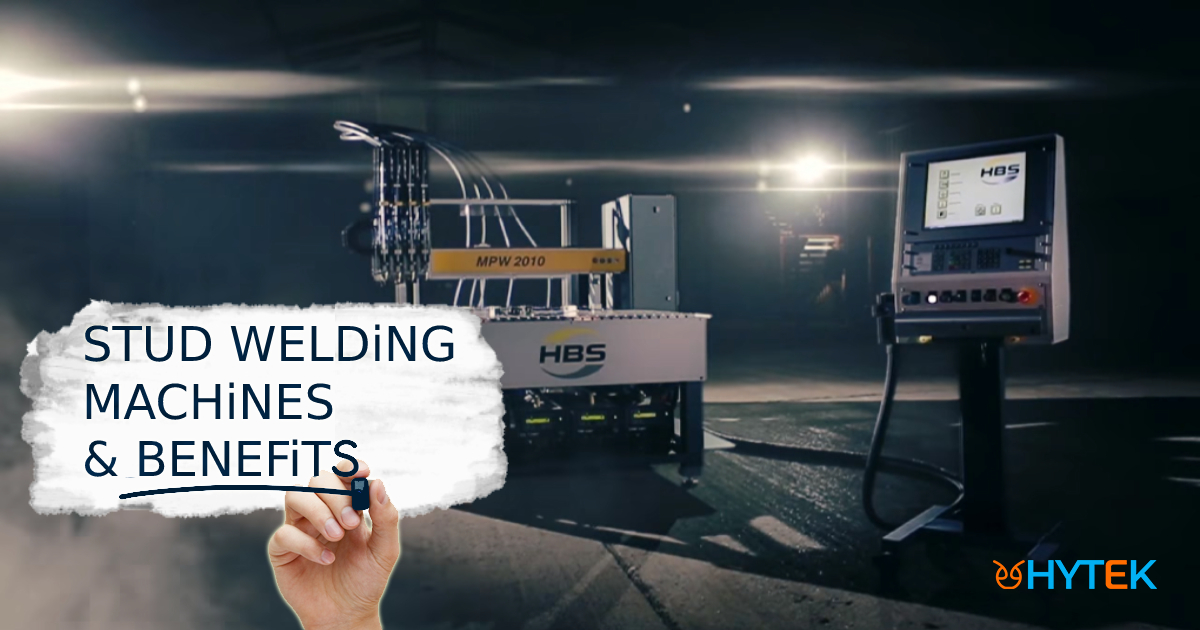Stud Welding Machine & Benefits
What is Stud Welding?
Stud welding may be a technique almost like flash butt welding where a fastener or specially formed nut is welded onto another metal part, typically a base metal or substrate. The fastener can take different forms, but typically fall into threaded, unthreaded, or tapped. The bolts could also be automatically fed into the stud welder.
Stud welding may be a complete one-step fastening system, using fasteners called weld studs. Weld studs are available in a spread of styles, threaded, unthreaded, tapped, etc., sizes and shapes for a good range of applications.
Stud Welding Equipment
The equipment required for stud welding consists of the following:
-
A direct current Power Supply
-
A Controller
-
A Weld Gun
-
Cables to tie the system components and the base metal together
In most systems, the facility supply and controller have combined together components called the "Welder".
What is a weld stud used for?
Arc Stud Welding is usually wont to weld large diameter fasteners to rougher and thicker base metals. Arc Weld Studs could also be almost any shape and there are actually many designs, however, they need to have one end of the fastener designed for Arc welding equipment.
How does stud welding equipment work?
During stud welding, an arc is ignited between one end of the stud and therefore the workpiece. Both joining partners are melted then joined under low contact pressure. The stud welding process usually takes but a second.
How does a Stud Gun work?
The welding stud is placed (with a tool called the Stud Gun) in touch with the bottom metal, a welding arc is drawn which melts the welding stud base and a neighborhood of the metal workpiece for metal fastening. The welding stud is then forced into the melted area and held in situ until the metals re-solidify.
Read on the Benefits of Welding Curtains, buy one & make your employee safe.
Benefits of stud welding Machine
The benefits of Stud Welding Machines are;
-
Variety of Fasteners - There is a wide range of standard, in-stock fasteners, called weld studs. If there isn't exactly what you need, Hytek Marketing will design and manufacture special fasteners as per your application.
- All Types of Metals - Practically all types of metal can be adapted to stud welding. Aluminum, Mild Steel, Stainless Steel, Copper, & Brass are the most common metals used. Exotic metals such as titanium and Inconel are also used.
- Weld Strength - Permanence and Integrity - Also produces a full penetration cross sectional weld.
-
Elimination of Secondary Operation - No need to drill or tap holes, No need to polish or grind surface. No rivet heads, bolts, nuts or washers; eliminates the associated types of equipment & costs.
-
Uniformity & Repeatability - A Stud welder precisely controls, monitors the amount of energy used.
-
Speed - Can weld up to 30 times in a minute. With an automatic machine, 1800 studs can be fastened per hour!
-
Accuracy - With simple tooling, a tolerance of ± .015" is standard with portable equipment. In bench-type equipment, standard tolerance is ± .010.
-
Attractive Appearance - The fastener helps the surface mounted to one side of the workpiece which eliminates ugly rivet heads, bolts, nuts, and washers
Go through the video, for a detailed working of CNC Stud Welding Machine
The applications of stud welding are endless!
If you’re looking for a stud welding machine or pin welding machine that complies with international standards, then contact hytek marketing. We are the best company that supplies metal fabrication machinery equipment all around the globe so no order is too small or too large to complete!

